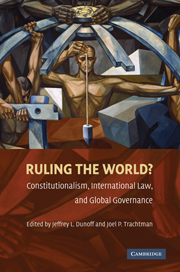Book contents
- Frontmatter
- Contents
- Contributors
- Preface: International Institutions: Why Constitutionalize?
- Acknowledgments
- PART I WHAT IS CONSTITUTIONALIZATION BEYOND THE STATE?
- PART II THE CONSTITUTIONAL DIMENSIONS OF SPECIFIC INTERNATIONAL REGIMES
- PART III CROSSCUTTING ISSUES
- 9 Human Rights and International Constitutionalism
- 10 The Cosmopolitan Turn in Constitutionalism: On the Relationship between Constitutionalism in and beyond the State
- 11 Constitutional Heterarchy: The Centrality of Conflict in the European Union and the United States
- 12 Courts and Pluralism: Essay on a Theory of Judicial Adjudication in the Context of Legal and Constitutional Pluralism
- 13 Whose Constitution(s)? International Law, Constitutionalism, and Democracy
- Index
- References
11 - Constitutional Heterarchy: The Centrality of Conflict in the European Union and the United States
Published online by Cambridge University Press: 05 June 2012
- Frontmatter
- Contents
- Contributors
- Preface: International Institutions: Why Constitutionalize?
- Acknowledgments
- PART I WHAT IS CONSTITUTIONALIZATION BEYOND THE STATE?
- PART II THE CONSTITUTIONAL DIMENSIONS OF SPECIFIC INTERNATIONAL REGIMES
- PART III CROSSCUTTING ISSUES
- 9 Human Rights and International Constitutionalism
- 10 The Cosmopolitan Turn in Constitutionalism: On the Relationship between Constitutionalism in and beyond the State
- 11 Constitutional Heterarchy: The Centrality of Conflict in the European Union and the United States
- 12 Courts and Pluralism: Essay on a Theory of Judicial Adjudication in the Context of Legal and Constitutional Pluralism
- 13 Whose Constitution(s)? International Law, Constitutionalism, and Democracy
- Index
- References
Summary
Introduction
In the debates about whether to take constitutionalism beyond the state, the European Union invariably looms large. One element, in particular, that invites scholars to grapple with the analogy between the European Union and global governance is the idea of legal pluralism. Just as the European legal order is based on competing claims of ultimate legal authority among the European Union and its member states, so, too, the global legal order, to the extent that we can speak of one, lacks a singular, uncontested hierarchy among its various parts. To be sure, some have argued that the UN Charter provides for a basic ordering of the international legal system akin to a constitutional charter. Others urge us to view the World Trade Organization as the foundation for global constitutional order. And yet legal and institutional fragmentation among the various regimes in the international arena broadly persists, as in the unsettled relationship among, say, trade, environmental, and human rights regimes. Moreover, with regard to the basic normative hierarchy as between domestic and international legal orders, the old debate between monism and dualism has run its course and the practical result is a tie. The international legal order claims autonomy from, and authority over, the state, whereas the state, in turn, claims primacy in the creation, direction, and implementation of international law.
With regard to the European Union itself, some take the lack of conclusive ordering as a sign of the absence of constitutionalism.
- Type
- Chapter
- Information
- Ruling the World?Constitutionalism, International Law, and Global Governance, pp. 326 - 355Publisher: Cambridge University PressPrint publication year: 2009
References
- 38
- Cited by



